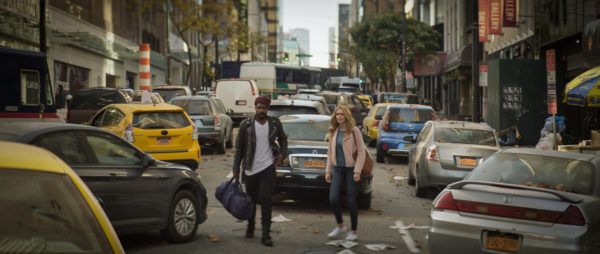
Each week Joe and Terry discuss the most recent episode of CBS All Access’s The Stand, alternating between our respective sites.
Spoilers follow for Episode 2 “Pocket Savior”…
Episode 1.02 “Pocket Savior”: Musician Larry Underwood is on the cusp of his big break when “Captain Trips” strikes New York. Alone and wandering an empty city, he meets an alluring new acquaintance also desperate to escape. Meanwhile, an incarcerated Lloyd Henreid comes face-to-face with Randall Flagg, The Dark Man himself, who makes him an enticing offer.
Miss a review? Ep 1
JOE
Alright Terry, we’re back for the second episode of The Stand, which clocks in at a super-sized 65 minutes. Last week we had quite a few questions about the show, specifically the narrative structure wherein parts of the show is set in the Boulder Free Zone, but the majority is set five months prior.
“Pocket Savior” confirms that, at least for now, we’re sticking to that formula. After a brief introduction to Jovan Adepo’s Larry Underwood, Amber Heard’s Nadine Cross and Gordon Cormier’s mute Joe arriving in Boulder, the majority of the episode is spent following Larry’s journey out of New York. Much like “The End”, it’s a lot of character work as we learn about Larry’s loving relationship with his mother and his tempestuous relationship with former roommate Vince, who accuses Larry of stealing his star-making music.
On one hand this reveals useful information about who Larry was pre-pandemic (drug abuser, womanizer, overall shady dude), which contrasts with how he is with Nadine and Joe, as well as the wealthy, slightly neurotic woman he meets once most of New York’s citizens are dead. That would be episode MVP Heather Graham as Rita Blakemoor, who stands out as the episode’s most intriguing figure. Introduced sitting on a park bench in Central Park in an eye-catching white suit, Rita immediately trusts Larry, shoots a nearby bird feeder, then makes him a meal.
It’s the kind of gonzo performance that The Stand has been missing and while her storyline with Larry sadly devolves into The Walking Dead territory (roaming Wall Street rapists offering millions for sexual gratification and an extended sojourn into the sewers), Graham is never less than watchable. Rita’s face when she rescues Larry from a Randall Flagg (Alexander Skarsgård)-induced hallucination is full of bemusement; it reminds me of the kind of naive innocence of so many of Graham’s early roles. Terry, I was just so happy to see her!
Which is also why her final scene is so evocative. As she and Larry make camp under the Brooklyn Bridge and he retires for the night, Rita stands at arm’s length away from the falling rain, drinking booze and popping pills.
Is she planning to die by suicide (she had just confessed to the strangeness of still being alive when so many others weren’t)?
Or is she simply staring into the void and considering her situation as one of the last people on earth?
Considering that we don’t see Rita in Boulder, there’s a genuine mystery as to what happened to her, which is made all the more intriguing by the edit that quite literally replaces Rita with the very-similar looking Nadine.
So Terry, what do you make of this mystery? Does it work better for you than the reveal in last week’s episode that Frannie and Stu are shacked up and Harold is by his lonesome? What are your thoughts on the introduction of Nadine with Flagg’s black rock already in hand? And were you, like me, bored to tears with the Lloyd Henreid (Nat Wolff) parts of the episode?
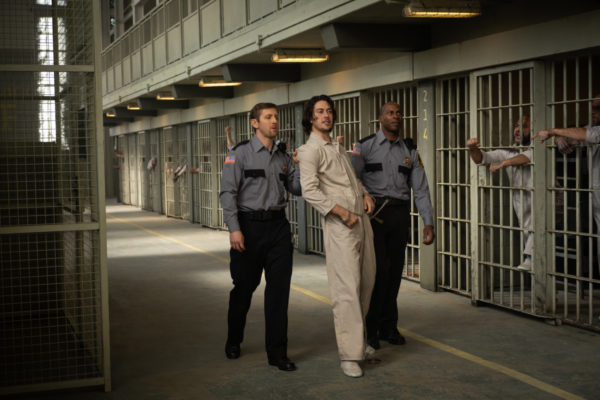
TERRY
I’ll be honest, Joe. I’m at the point where I’m going to have to just let go of my dislike of the framing device because I’m afraid my critique of the show will become stale. I will just start by saying that The Stand feels like it’s made by people who loved LOST and then told the writers “Do that.” The reason it worked so well on LOST and – to me – doesn’t here are the choices of what is shown.
You mentioned that “Pocket Savior” is a lot of character work for Larry Underwood, but too much of the episode is spent with him clawing his way through the nightmare sewers. Yes, there’s some evocative sequences and, like you, I genuinely smiled at Rita’s reaction when she saved him. But it added nothing to his character because we had already seen his relationship with his mother and his former roommate (who claims Larry stole his chorus).
I promise that this will be the last time I harp on the structure, but by doing these LOST-style vignettes in a show that’s only nine episodes instead of LOST’s multiple 20+ seasons, a lot of the nuance in King’s novel is lost. For example, this episode uses shorthand to tell us Nadine is evil. I’m guessing we’ll learn more about Nadine and her black rock in the near future, but between that, Frannie asking her if she’s dreamt of Abagail and Nadine’s airy response, we’re already clued into her being one of Flagg’s lackeys.
Maybe the next episode will fill in some of that missing nuance but what King’s The Stand does really well is spend a lot of time with the characters, exploring why they follow either Abagail or Flagg. That nuance is lacking so far, and a lot of it has to do with the way the episodes are structured to provide very little context. Nadine is one of the more intriguing characters in the book and I wish her introduction had packed more of a punch. We know nothing of her history with Larry or Joe.
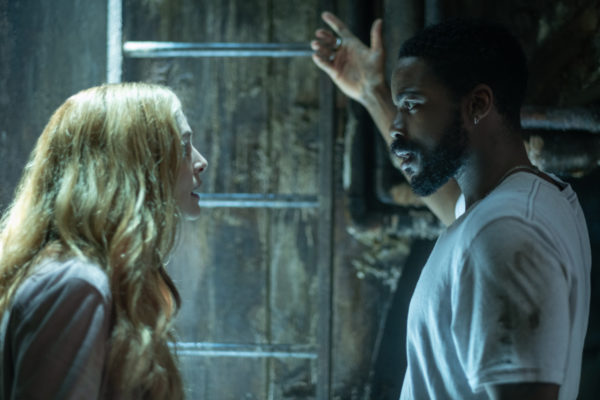
You also mention the mystery of Rita and whether she’s alive or dead, but I hate to say we probably aren’t seeing anymore of her because Larry makes a very quick throwaway line that the last woman he was with killed herself. I might have missed it myself if I didn’t rewind a chunk of the episode. And as much as I loved Heather Graham’s performance (and wish she were a main character), it was a lot of lead up for a missed opportunity.
I promise I won’t keep harping on this, but the benefit of a TV series over a movie is that TV is more character-driven and movies tend to be more plot-driven because of the length of time we have to spend with characters. That structure fits The Stand exceptionally well because it’s about the characters we meet along the way and their propensity for violence and evil and peace and goodness that’s far more interesting than the novel’s fairly standard Good versus Evil plot. And yet, this adaptation feels more like it wants to be a movie than a character-driven series.
I can see why you’d be annoyed with Lloyd’s sections but they were the part that I wanted to know more about, ironically. All of our flashbacks so far have been (mostly) focused on The Good Guys. Even though “The End” was partially focused on Harold’s incel tendencies, most of the episode was about Stu and, to a lesser extent, Frannie…particularly from an emotional perspective. “Pocket Savior” continues this trend by mainly focusing on Larry’s spiral and eventual salvation. So being able to see Lloyd’s predicament broke up the good guy monotony. And we really get to see the way Flagg operates by tempting people to come to his side.
It’s the way he says, “Oh, I’m real, babyyyyy. I’m real real.” The way he tells the starving Lloyd about his delicious lunch. Lloyd’s fascination with how handsome Flagg is (“you’re a beautiful man”) mixed with his embarrassment of eating a part of his cellmate because of starvation. All of this showcases, in very little time, the way Flagg snags the desperate to his side. I actually wanted more.
Am I being too harsh on the format, Joe? We also haven’t touched on the other two important characters introduced in “Pocket Savior.” I’m curious what you make of Ray Brentner (Irene Bedard) and Nick Andros (Henry Zaga) and their relationship to Abagail. And is it good leadership for Abagail to tell people something but then tell them not to tell anyone else what she said?
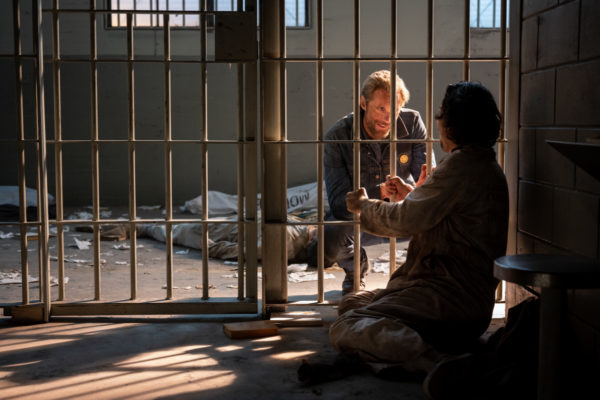
JOE
I had to laugh, Terry because when I first read “two other important characters” I couldn’t for the life of me figure out who you talking about. This is the distinction between Constant Readers and “average Joes” as it were; I remember that deaf Nick becomes important in the book, but his and Ray’s introduction as Abigail’s lieutenants is barely a blink and you’ll miss it moment over this 65 minute episode. If you weren’t familiar with the book, you would hardly know that these are anything more than passerbys.
With that said, no, I don’t think you’re being too hard on the format of the series. I keep having to remind myself that despite the lethargic pacing, this whole series – King’s 1000+ page opus – will wrap up in just seven more episodes. It’s actually kind of mind-boggling in that regard because there’s a simultaneous surface analysis of these characters and a refusal to, you know, actually advance the plot. If you asked me what “Pocket Savior” does aside from introduce a few new characters, I can’t honestly tell you…
So no, you’re not wrong for being peeved. As it stands (heh), right now this isn’t a very successful adaptation, nor is it a very successful stand-alone series. The framing isn’t helping. I do agree, however, that we’ll need to move on from harping on it next week, because I don’t think Boone and his writers will give up the ghost until everyone is set up in Boulder.
I won’t deny that seeing Skarsgård turn on the charm was fun (there’s a reason the exceptionally tall, good-looking and enticing actor was cast), but it didn’t work as well for me because the outcome is too obviously pre-determined. Even though Lloyd wasn’t as bad an individual as the other convenience-store robber, it’s pretty clear that he’s not a “good guy”. This, combined with the fact that Flagg waits until he’s nearly dead, made it immediately evident that he would agree to whatever Flagg offers; the temptation was intriguing, but it was unnecessary. Flagg could have skipped the effort and saved us all the time.
Which is why I’m so intriguing by characters like Nadine (and hope to be intrigued by folks like Nick and Ray). Because we know so little about them, there’s still some hope that they could be interesting characters in this mix. Aside from King’s inability to land the plane, my other gripe is that his characters tend to be either good or bad, with very few folks falling into the murky grey in the middle. Nadine was the character who eschewed that simple dichotomy for me in The Stand and it’s why she was my favourite.
As of now, I’m still very much on the fence with the series. The actors are good, the writing and characterization is thin and the pacing is glacial. Next week’s episode takes up to the ⅓ point, so I’m crossing my fingers something picks up.
Terry, what are your hopes for the next episode? You dangled Ray and Nick, so I’m curious if you were satisfied with what little we get? And are you concerned that Boone seemingly learned nothing from his New Mutants casting controversy with Zaga by casting the able-bodied actor rather than a real deaf actor?
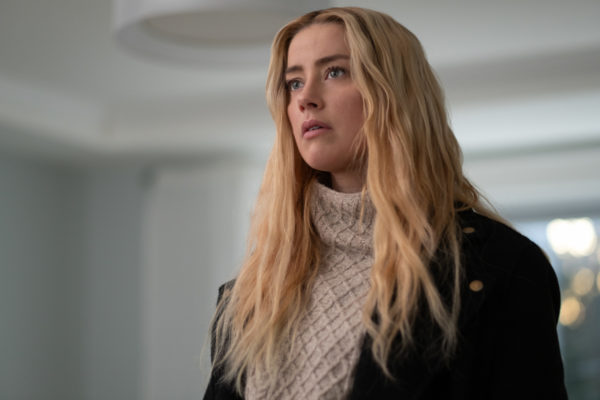
TERRY
I like the way you just primed that grenade and threw it to me, Joe. It’s like we’re playing a rousing game of hot potato…and then you just leave the room.
But it is a very fair point and one that I think we’re going to see repeated in another able-bodied casting choice with Brad William Henke as Tom Cullen. It’s already being rightfully called out by the Deaf community and last year Nyle DiMarco tweeted about the casting choice. So CBS, Boone and co. haven’t exactly been side-swiped by it. I just don’t really see much in the way they can defend this casting choice, not that Boone hasn’t apparently already tried in an instagram conversation:
Boone responded that his intention is to honor King’s book. He explained that the deaf character, in his dreams and when he turns into a ghost, can speak and hear, so it is okay to have a hearing actor because the character is both deaf and hearing depending on whether he is asleep or awake. Boone said Henry Zaga is a dedicated actor, ha[s] been hard at work learning ASL, and that there would be consultants who are deaf on set.
It’s a frustrating response that’s careless, thoughtless and inconsiderate considering it’s incredibly difficult for deaf actors to get acting roles. It’s the same frustration we see when trans characters are portrayed by cisgendered actors. There’s a lack of parity with regards to who gets roles and so when situations like this occur…it further exacerbates the problem.
How bizarre, by the way, that it’s the same actor in both controversies.
As for their introduction…I honestly had to go look up the names on the The Stand wiki to remind myself of their importance. I’m afraid that’s probably going to be a trend and it’s made me realize just how little characterization we’re getting. For instance: Lloyd has quite the horrific backstory both before and after Captain Trips and, you’re right, he is a pretty evil dude compared to the more morally gray Nadine, but it’s just a reminder of what we’re not getting with each character.
As for the next episode…well, I’m hopeful we’ll get to know more about Nadine and some context for why she’s already wearing the Flagg stone. And I’m hoping we get some more forward momentum.
As you said, we’re already nearly one third of the way through the series and the pacing feels rudderless because of the structure. The present needs a little jolt and hopefully “Blank Page” will give us that.
I guess we’ll find out next week when we’re back at Gayly Dreadful for episode three.
The Stand airs weekly on Thursdays on CBS All Access.